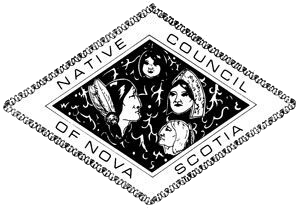The Native Council of Nova Scotia
The Native Council of Nova Scotia is structured by and from the Community upwards. The Native Council of Nova Scotia is directed by and accountable to the Community. Regardless of where a Community member lives on the traditional homelands of Mi’kma’ki in that part now known as Nova Scotia, they would no longer have to feel alone, forgotten, or live in fear or want.
The Native Council of Nova Scotia represents the off-reserve Mi’kmaq/Aboriginal people’s community as a whole and has established thirteen (13) geographic Zones encompassing the entire province of Nova Scotia.
The NCNS Community “Zones” within the Province of Nova Scotia support and follow the Constitution of the Native Council of Nova Scotia. The Community Zones administer their affairs within the geographic boundaries of their respective Zones and collectively interact together as the NCNS Community of Mi’kmaq/Aboriginal People on a provincial basis.
Each Zone annually elects one of their members to act as their Zone Board of Director and another as their Zone Alternate Board of Director. The Board of Director and or Alternate is required to represent the issues and interests of their Zone at the quarterly Native Council of Nova Scotia Board of Director meetings. Also sitting on our Council Board is our Community’s designated Mi’kmaq Keptin of our traditional Mi’kmaq Grand Council, and our Community’s honourary Elder and Youth Council Board of Directors.
Each Zone is organized with a local executive consisting of an annually elected President, Vice President, Secretary, Treasurer and their numerous Committees who administer the day to day affairs of the Zone to ensure that the needs, requirements, concerns and voice of the individual or family or constituent is addressed and heard.
Every year, each Zone elects from its local community membership, three (3) delegates to represent their Zone community at the provincial Annual General Assembly of the Native Council of Nova Scotia. The number of delegates that each Zone can send is uniform regardless of the Zone population or the number of locals within a Zone. Each Zone Community also sends to the Annual General Assembly a Community Elder and a Community Youth member to make up the Zone delegation.
Equal representation and equal voice is the right of each Zone Community regardless of the number of Community members residing in the Zone. This principle honours our way of governing our own affairs where all voices must be heard and are equal. Through the process of discussion, sharing, and wisdom, the determination on consensus or by majority, for an action, decision or policy, this becomes the collective decision and resolve of the NCNS Community of Mi’kmaq/Aboriginal Peoples organized as the Native Council of Nova Scotia.
The Office of Chief and President of the Native Council of Nova Scotia is an elected Office by the process of universal sufferage. The Chief and President is elected by the majority vote of registered Community voters every four (4) years. Any Mi’kmaq/Aboriginal person in Nova Scotia who does not reside on an Indian Act reserve, is eligible to register and vote for the Native Council of Nova Scotia Chief and President.
The Office of Chief and President manages the actions, initiatives, decisions and policy advanced by the Annual General Assembly; and in between Assemblies, those decisions directed by the Board of Directors.
The Chief and President with the thirteen Board of Directors and Alternate Directors are accountable to the NCNS Community of Mi’kmaq/Aboriginal Peoples.
The Board of Directors meet quarterly throughout the year and are responsible for ensuring that the work that the Council does is in keeping with the Association’s aims, duty of office, objectives and resolutions of the Annual General Assembly.
The Board does not decide how this work will be carried out on a day to day basis. In certain instances the Board serves on established Committees to develop specific processes, oversight responsibilities (i.e. Finance Committee, Office Policy Committee, Social Housing Committe, etc), and so forth.
The Chief and President has overall responsibility to carry out and manage the Native Council of Nova Scotia directions, policies and decisions. The Chief and President is the executive link between the policy-making Assembly, the Board of Director’s directions and the administration of the Native Council of Nova Scotia. The Chief and President also ensures that the services, programs, initiatives and policies are carried out effectively and efficiently by the Council employees.
The Chief and President represents the Native Council of Nova Scotia in negotiations with the Government and is the spokesperson for NCNS political positions, programs, services, issues and other negotiations for the benefit of the NCNS Community of Mi’kmaq/Aboriginal Peoples – the NCNS Community voice to the Councils of Government and the NCNS Community going forward to a better future.
